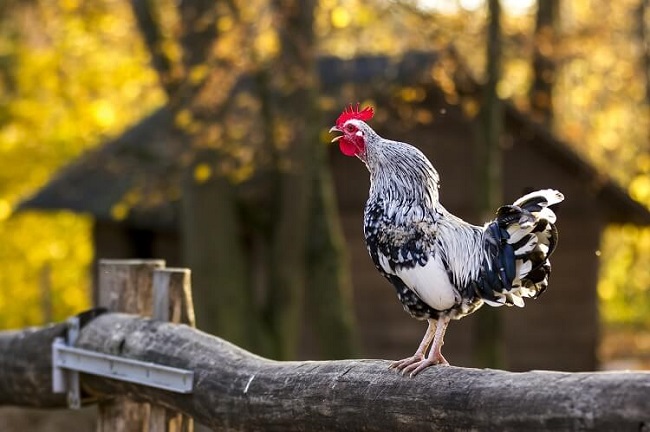A symphony of sounds emanates from a chicken coop: clucks, squawks, crows, and even purrs. To the untrained ear, it might sound like a cacophony, but chickens, like other animals, communicate through these sounds.
By learning to decode these vocalizations, chicken owners can gain deeper insights into their flock’s health, happiness, and overall wellbeing. Let’s dive into the world of chicken sounds and their meanings.

10 Common Chicken Sound Meanings
Here are some common chickens sound meanings:
Read Also:
1. The “Bawk Bawk Bawk” Sound
This repeated, loud, and frantic sound usually signals distress or danger, such as a predator nearby. It’s a chicken’s alarm call to warn the rest of the flock.
2. The Egg Song
Often a triumphant and loud series of clucks, this is a hen’s proud announcement after laying an egg. It can also signal the desire to lay an egg if the nest box is occupied.
3. The Broody Cluck
A low, throaty, and repetitive cluck usually indicates a hen has gone broody, meaning she wants to hatch eggs. You’ll often find the hen refusing to leave the nest box.
4. The Food Call
A series of excited, rapid clucks can mean a chicken has found a tasty treat. This sound alerts other members of the flock to the feast.
5. The Rooster’s Crow
Most commonly associated with dawn, a rooster’s crow serves multiple purposes. It asserts dominance, communicates territory, and also acts as an alarm for potential threats.
6. Growls and Squawks
These sounds usually indicate a chicken is annoyed or frightened. For instance, a hen might squawk if another hen tries to share her nesting spot.
7. The Contented Purr
Yes, chickens can purr, similar to cats. This low, trilling sound indicates that a chicken is content, comfortable, and relaxed.
8. The Cackle
Often heard after a chicken has laid an egg, or after a perceived danger has passed. It can be seen as a sign of relief or achievement.
9. Chirping
Usually a sound made by chicks, chirping can mean several things. Happy chirps are soft and melodious, while high-pitched, loud chirps usually mean they are cold or in distress.
10. The Rooster’s Cluck
Roosters cluck, too, often to alert hens about food or to call them over. It’s part of the rooster’s protective behavior.
Understanding Your Chickens Better
By understanding these common chicken sounds, you’ll be able to respond better to your flock’s needs. If you hear the alarm call, you can quickly check for predators. Hearing the food call? Perhaps you might join in the fun and see what tasty treat they’ve found.
The Silent Language: Understanding Chicken Body Language
While vocalizations play a significant role in chicken communication, body language is also vital. For example, a dominant hen or rooster may puff up their feathers and stand tall to assert authority, while a submissive chicken will make itself look smaller.
Rooster’s Dance: Courting Rituals
Roosters often perform a dance to impress hens, which includes a two-step dance called “tidbitting” coupled with soft clucking sounds. Understanding this can help you better observe the social dynamics in your flock.
Molting Sounds: The Stress Call
Molting, the process of losing and regrowing feathers, can be stressful for chickens. During this time, they may make unique sounds expressing discomfort. Providing extra care during this period is crucial.
Comforting Sounds: Bonding with Your Flock
Spending time with your chickens and observing their sounds can create a strong bond. Chickens can recognize their owners and may create unique sounds, similar to a cat’s purr, when being held or petted.
Read Also:
Conclusion
Chickens are more than just livestock; they’re intelligent animals with their own language. Learning to decode these sounds not only allows you to take better care of your chickens, but it also enriches your experience of keeping them.
So the next time you hear a cluck, squawk, or crow, you’ll know just what your feathered friends are saying. Tuning into your chicken’s communication is a step closer to understanding and appreciating these amazing creatures.
























